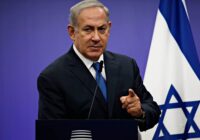With yet more unrest between Palestinians and Israelis, both sides are stuck in limbo, says Josef Olmert.
Alphonse de Lamartine, a 19th century intellectual, politician and a noted scholar of the Middle East, said the French Revolution of 1848 occurred because his countrymen “were bored.”
Well, Mahmoud Abbas, the president of the Palestinian Authority (PA), may not have been bored himself, but judging by his statements he has become convinced that the world—Arab states in particular—is bored with the Palestinian issue.
The rise of the Islamic State; the growing Iranian threat to regional stability; the gradual collapse of key Arab countries such as Iraq, Syria, Yemen and Libya; and the growing refugee crisis seem to have taken the limelight away from the Palestinians. Amid all these upheavals, the Palestinian-Israeli conflict seemed to be an exception, an oasis of relative quiet in an otherwise ocean of storm.
So, something had to be done—something that would shatter the status quo and turn attention back to the Palestinians and their plight. And plight they have, as can be seen by the ferocity of anti-Israeli sentiment exhibited by many Palestinians throughout October, but also by the growing frustration toward Abbas and the PA.
Mohammad Dahlan of Fatah, Hamas in Gaza and other Palestinian factions have started to challenge the authority of Abbas and the PA. In September, US President Obama addressed the United Nations General Assembly and gave one of his rousing speeches, but he didn’t mention the Palestinian-Israeli conflict even once. And Israeli Prime Minister Benjamin Netanyahu has made all the rounds lately—mostly mistaken—about Iran and paid little, if any attention to the Palestinians.
Something had to be done, and Abbas decided to do it, starting a campaign about an “Israeli attack” on the al-Aqsa Mosque compound. You want to inflame feelings in this conflict? Then go to Jerusalem and the sites that are sacred to Muslims and Jews.
Jerusalem had been holy to Jews for over 1,600 years before the emergence of the Prophet Muhammad and Islam. In fact, the Wailing Wall riots of 1929 erupted when Muslims objected to prayers of Jews there. Then, the Jewish community of Hebron, an old Jewish city, was slaughtered because of Muslim opposition to Jews praying in the Cave of the Patriarchs. All of this happened when there were no Jewish settlements, no “occupation” and no any Jewish state whatsoever.
Religion is a serious matter in the Middle East to Christians, Muslims and Jews. Israel has its own growing religious community, some of whom have become increasingly messianic, and for them, the holy sites of Jerusalem are key. It is a small piece of land there—the most precious piece of real estate in the world, but also the most volatile.
Responsible leaders should do their utmost to refrain from igniting fire, but Abbas did the exact opposite. Netanyahu had nothing to do with the flare-up over the Temple Mount, but he needs to understand that the status quo with the Palestinians is unsustainable.
The Israeli prime minister drew a conclusion from the Arab Spring that the Palestinian-Israeli conflict is not the key issue in the Middle East; it is not the root cause of instability in the region, but rather a symptom of it—something that has hardly anything to do with Israel.
Assuming Netanyahu is right, the question is: so what? While the Arab world and the international community turned their attention to the most pressing problems in the Middle East, he should have used the more conducive circumstances to Israel’s benefit and had his own initiative toward the Palestinians.
But he didn’t, and the truth is that we cannot be sure as to what would have happened if he did. However, while his passivity is troubling, it is also strategic. Netanyahu is not interested in an arrangement that requires him to make dramatic concessions, which his own party and its coalition partners would object to.
Netanyahu and his followers believe time is on Israel’s side, while Abbas and his followers believe time is with the Palestinians.
But Abbas is also politically paralyzed by his inability to reign in on his followers, let alone opponents, who want a struggle at all cost. And a religious one is preferable, because it is the most likely to arouse Arab and Muslim interest. Here is the inevitable collision course: a typical Palestinian and Israeli limbo.
Where are the Anwar Sadat and Menachem Begin of 2015?
The views expressed in this article are the author’s own and do not necessarily reflect Fair Observer’s editorial policy.
Photo Credit: Chameleons Eye / Shutterstock.com
 We bring you perspectives from around the world. Help us to inform and educate. Your donation is tax-deductible. Join over 400 people to become a donor or you could choose to be a sponsor.
We bring you perspectives from around the world. Help us to inform and educate. Your donation is tax-deductible. Join over 400 people to become a donor or you could choose to be a sponsor.
Support Fair Observer
We rely on your support for our independence, diversity and quality.
For more than 10 years, Fair Observer has been free, fair and independent. No billionaire owns us, no advertisers control us. We are a reader-supported nonprofit. Unlike many other publications, we keep our content free for readers regardless of where they live or whether they can afford to pay. We have no paywalls and no ads.
In the post-truth era of fake news, echo chambers and filter bubbles, we publish a plurality of perspectives from around the world. Anyone can publish with us, but everyone goes through a rigorous editorial process. So, you get fact-checked, well-reasoned content instead of noise.
We publish 2,500+ voices from 90+ countries. We also conduct education and training programs
on subjects ranging from digital media and journalism to writing and critical thinking. This
doesn’t come cheap. Servers, editors, trainers and web developers cost
money.
Please consider supporting us on a regular basis as a recurring donor or a
sustaining member.
Will you support FO’s journalism?
We rely on your support for our independence, diversity and quality.






